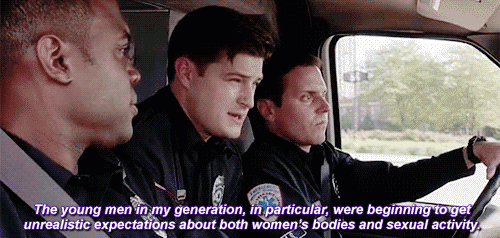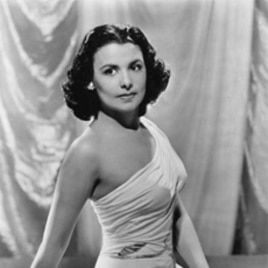The Male Gaze is objectifying and sexualizing a woman, seeing her as an object to be possessed and judged for the viewer’s pleasure. Or sometimes displeasure, which has to do with when women turn the Male Gaze onto themselves. They become the surveyed and surveyor: “She has to survey everything she is and everything she does because how she appears to others, and ultimately how she appears to men, is of crucial importance.” (Berger 46) The Male Gaze is very prevalent within popular culture because when you have a culturally male dominated society, the women are looked to as entertainment. Whatever they do needs to be done for the male’s enjoyment.
 |
| even something as simple as grocery shopping |
 |
| no shit, Brian |
bell hooks explains the Oppositional Gaze as a way to watch film or television with a critical, analytical eye without identifying with or wanting to be anyone on the screen. Normally, when we watch something, we emotionally connect to it in some way that we can live vicariously through a character. The Oppositional Gaze does away with that. “Looking at films with an oppositional gaze, black women were able to critically assess the cinema’s construction of white womanhood as object of phallocentric gaze and choose not to identify with either the victim or the perpetrator.” (hooks, Black Looks 122)
The reason for this development was because the cinema did not hold a place for black women, especially not in a sexual sense. What began as shame and anger at the film industry’s refusal to create this role started a new movement within feminist film critique. Although, it’s still a work in progress as “many feminist film critics continue to structure their discourse as though it speaks about “women” when in actuality, it speaks only about white women.” (hooks 123) In the early days of black people breaking into Hollywood films, the depth roles were sparse but even more so for women to play any character remotely considered a sexual being. For example, Lena Horne beautiful and talented as she was, was rarely given a chance to showcase her talent and cast as a leading lady. “I was a test case. I could never feel like I was just a person working in movies.”
 |
| not leading lady material because racism |
I think a lot of the way I’ve understood this part of society, the male gaze specifically, is due to the patriarchal society we live in. These roles are ingrained in us at such a young age by gender norms from the older generation and continuously perpetuated by our immediate environment as well as contemporary media. “Most of us learned patriarchal attitudes in our family of origin, and they were usually taught to us by our mothers. These attitudes were reinforced in schools and religous institutions.” (hooks, The Will to Change 23) hooks even references Terrence Real’s story about how his son who liked to dress up as Barbie got the message from his peers that this wasn’t okay to society, despite his parents not objecting to it at all. “Without a shred of malevolence, the stare my son received transmitted a message. You are not to do this.” ((Real, How Can I Get Through To You) hooks, The Will to Change 22)) And part of why this happened is because dressing like Barbie really means dressing up - something that is done to attract the male gaze.
 |
| no one looks like this, okay. not even a 3 year old boy playing dress up |
However, I am very aware of the male gaze turned inward (more than being surveyed) and it does bother me. It’s harder to grasp the oppositional gaze because it’s so easy to let yourself go and fall into a story on film or TV without analyzing it but I’m trying. Nobody wants to be the person in the room who goes into a whole diatribe as to why the story we just saw wasn’t good enough. But the idea that media shouldn’t be analyzed and critiqued in order to make it better is ridiculous. Society does need to break away from this mentality to a place that makes everyone comfortable.
Bibliography
1. Berger, John. Ways of Seeing. London: British Broadcasting : Penguin, 1972.
2. Hooks, Bell. Black Looks: Race and Representation. Boston, MA: South End, 1992.
3. Hooks, Bell. The Will to Change: Men, Masculinity, and Love. New York: Atria, 2004.
4. "Black Hollywood: The Originals." - Fayard Nicholas, Herb Jeffries, Lena Horne : People.com. 21 Feb. 2005. Web.
Bibliography
1. Berger, John. Ways of Seeing. London: British Broadcasting : Penguin, 1972.
2. Hooks, Bell. Black Looks: Race and Representation. Boston, MA: South End, 1992.
3. Hooks, Bell. The Will to Change: Men, Masculinity, and Love. New York: Atria, 2004.
4. "Black Hollywood: The Originals." - Fayard Nicholas, Herb Jeffries, Lena Horne : People.com. 21 Feb. 2005. Web.
No comments:
Post a Comment